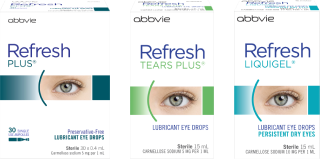Should I see a doctor
about Dry Eye?
While many people experience Dry Eye symptoms at some point, there are times when it’s important to consult a healthcare professional. Let’s explore when it might be time to reach out for expert advice.
Understanding your Dry Eye symptoms
Dry Eye symptoms can range from mild to severe and may include:
While occasional symptoms can often be managed with over-the-counter solutions and lifestyle changes, certain situations warrant a doctor’s visit. If any of these symptoms concern you, you should seek advice from a healthcare professional. Read more about Dry Eye symptoms.
When to see a doctor for Dry Eye
Your symptoms will indicate if you should seek medical advice or testing. Consider these factors:
- Persistent symptoms: If your symptoms don’t improve with home remedies or over-the-counter treatments, it’s wise to consult a doctor. Persistent discomfort could indicate an underlying issue that needs attention.
- Severe discomfort: If your Dry Eye symptoms become severe or debilitating, affecting your daily life, it’s time to seek professional help. No one should have to endure constant pain or irritation.
- Changes in vision: Any sudden changes in your vision, such as significant blurring or difficulty seeing, should be evaluated promptly by an eye care specialist.
- Eye infections: Redness accompanied by discharge, swelling, or pain might suggest an infection. It’s important to get these symptoms checked out promptly to prevent complications.
- Underlying health conditions: If you have conditions like lupus, rheumatoid arthritis, or thyroid disorders, regular eye check-ups are important. These conditions can exacerbate Dry Eye and require specialised care.
- Medication side effects: If you suspect that your medication might be causing or worsening your Dry Eye symptoms, discuss this with your doctor. They might adjust your treatment plan or suggest alternatives.
What to expect at your appointment
When you visit your doctor, they’ll likely perform a comprehensive eye exam and may ask about your medical history, lifestyle, and any medications you’re taking. This helps them tailor a treatment plan that’s just right for you.
Don’t be shy – ask your questions
Remember, seeking help is a positive step towards eye comfort and health. It’s perfectly okay to ask for guidance and support from professionals who care about your wellbeing. If you have any questions or need assistance, don’t hesitate to reach out to your healthcare provider.
Treatment options
Your doctor may suggest various treatments, such as prescription eye drops, or even advanced therapies depending on your condition’s severity.
In the meantime, if you're looking for relief from Dry Eye symptoms, feel free to browse our selection of products. We're here to help you find just the right solution for your comfort and peace of mind!
ALWAYS READ THE LABEL. FOLLOW THE DIRECTIONS FOR USE. IF SYMPTOMS PERSIST, TALK TO YOUR HEALTHCARE PROFESSIONAL.
AU-RFP-240063. November 2024.







